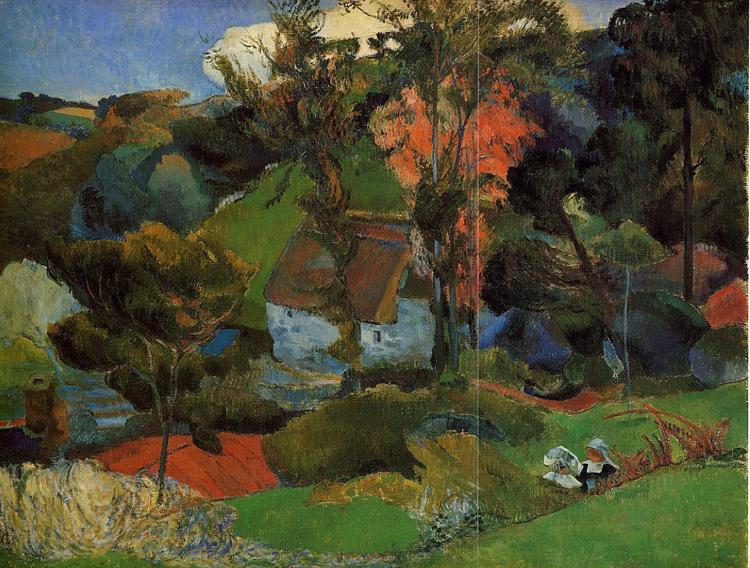説明
Paul Gauguin's 1888 painting Aven Running Through Pont-Aven is a fascinating reflection of the artist's innovative approach to painting and his quest to capture the essence of rural Breton life through a deeply personal vision. Set in the heart of Pont-Aven, a village that would become a major centre of the French Brittany school of painting, the work evokes a sense of movement and fluidity that is evident in its title and composition.
Analyzing the work, one is captivated by the River Aven, which meanders through the landscape, becoming the central element of the painting. Gauguin uses fluid, gestural strokes that highlight the dynamism of the water, in contrast to the tranquility one would normally expect from a natural setting. This treatment of water not only suggests its movement, but also acts as a symbol of life in motion in the region, where nature and human activities are intrinsically connected.
The colour palette that Gauguin employs is another notable aspect of the painting. While there is a use of warm tones that convey the luminosity and vitality of the surroundings, the blue and green hues of the river and vegetation complement these colours, creating a visual balance that catches the viewer's eye. Through these chromatic choices, Gauguin not only depicts the landscape of Pont-Aven, but also gives free rein to his emotion and personal interpretation of natural beauty. This innovative use of colour is characteristic of his post-impressionist style, where emotional expression and symbolism often surpass mere naturalistic representation.
As for the characters, the work does not feature human figures in the foreground, suggesting a deeper reflection on the relationship between humans and nature. However, the latent presence of the daily life of the region’s fishermen and farmers is felt in the overall mood of the painting. This approach aligns with Gauguin’s orientation towards the symbolic and the emotional, where he often sought to capture the essence of people’s spiritual life in their natural surroundings, rather than focusing on straightforward portraits of individuals.
Gauguin's work on "Aven Running Through Pont-Aven" can be framed within his time in Brittany, where he began to explore a style that would gradually move away from Impressionism. Unlike his contemporaries, who focused on capturing the light and atmosphere of a particular moment, Gauguin opted for a more personal and subjective narrative that challenged the conventions of the time. This work aligns with other works from his production at that stage, such as "The Yellow Christ" or "The Vision After the Sermon", which also show emotional and symbolic depth, as well as a strong chromatic and compositional charge.
Ultimately, it can be said that “Aven Running Through Pont-Aven” is a testament to Gauguin’s ability to transform a seemingly simple landscape into a visual experience that resonates with the viewer. His ability to capture the spiritual connection between humanity and nature, through his distinctive style, continues to resonate, inviting contemplation and personal interpretation. This work not only represents a moment in the artist’s timeline, but also underscores his commitment to an artistic expression that goes beyond the visible, into the very heart of the human experience.
KUADROS ©, a famous painting on your wall.
Hand-made oil painting reproductions, with the quality of professional artists and the distinctive seal of KUADROS ©.
Painting reproduction service with satisfaction guarantee. If you are not completely satisfied with the replica of your painting, we will refund 100% of your money.

